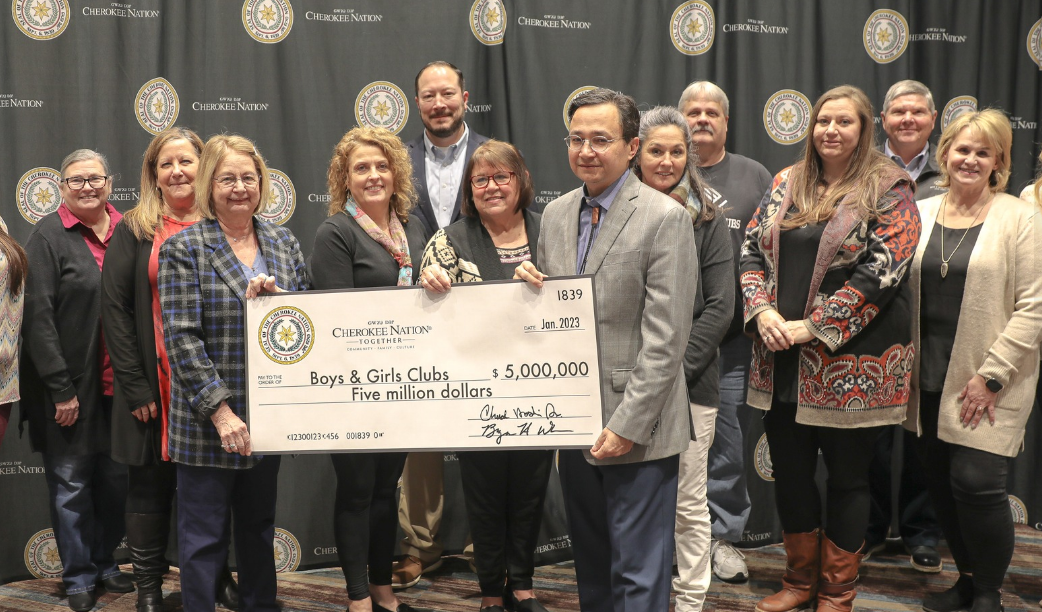
- Details
- By Chuck Hoskin Jr
Guest Opinion. For more than 160 years, the Boys & Girls Clubs organization has offered mentorship and support for youth. They have grown to serve local communities across the country, and they have long brought a special focus to youth living on Native lands. Today, Boys & Girls Clubs play a special role across the Cherokee Nation Reservation.
The many local clubs in northeast Oklahoma help young people reach their full potential. Their efforts especially focus on the kids who have the least, and their programs nurture both educational and emotional growth.
That is why Cherokee Nation is infusing the Boys & Girls Club programs with a historic $5 million investment over the next two years. The donation will help with capital projects, food security programs and grants to offer more services throughout the year, including holidays and the summer months.
Over the last four years, we’ve given nearly $1 million to the Boys & Girls Clubs across the Cherokee Nation Reservation. The new investment will support clubs in Bartlesville, Pryor, Tahlequah, Nowata, Chelsea, Tulsa, Adair County, Delaware County and Sequoyah County.

We cannot measure what it means for a young person to have a safe place staffed with trained adults to go after school, or to have a place where they can always find a healthy meal. At Cherokee Nation, we look to the young people across the reservation as the hope of our future, so we put a high value on doing whatever we can to set them up for success in the years to come.
Boys & Girls Clubs are already helping meet many of the goals we aspire for our youth – mentoring, socialization and building essential life skills, like goal-setting. With this grounding in strong character and supportive community, Cherokees can thrive not only in school, but throughout a lifetime.
We know that a strong mentorship program builds self-esteem and healthier young minds. Besides traditional academic support, Boys & Girls Clubs offer programs in areas like art, culture and physical wellness. Lives are changed for the better when a young person finds a safe place to learn from positive role models who can help navigate the challenges of growing up.
Cherokee Nation is earmarking $2.7 million of new funding for a child care pilot project at the Boys & Girls Club on the reservation to provide services when kids are out of school. The tribe will also contribute $100,000 each to nine programs for food security initiatives over the next two years. Funds can be used to support existing food programs or create new programs to help students and families through food donations, food cards, nutrition classes or other programs. We will also contribute an additional $100,000 to each of the nine clubs for capital expenses like maintenance and equipment.
This increased investment was recommended by the Cherokee Nation Early Childhood Task Force, which was created last year to identify opportunities and unmet needs regarding early child care inside the 7,000-square-mile Cherokee Nation Reservation. That task force was part of the Verna D. Thompson Early Childhood Education Act, which Deputy Chief Bryan Warner and I put forward in 2021 to replace or refurbish all of the tribe’s Head Start centers.
Boys & Girls Clubs are fun environments to learn the social and emotional skills that our children need to thrive as Cherokees. We see children blossom through these efforts.
As a father and grandfather, I know personally how valuable it is for youth to have a positive and safe environment to learn and grow. As Principal Chief, I know we must invest in the kind of programs that build strong individuals, preserve our Cherokee culture and strengthen local communities. The Boys & Girls Clubs within the Cherokee Nation provide those opportunities for the families that need them the most.
Chuck Hoskin, Jr. is the principal chief of the Cherokee Nation.
More Stories Like This
The SAVE America Act Threatens Native Voting Rights — We Must Fight BackThe Presidential Election of 1789
Cherokee Nation: Telling the Full Story During Black History Month
Jesse Jackson Changed Politics for the Better
Native News Online at 15: Humble Beginnings, Unwavering Mission
Help us defend tribal sovereignty.
At Native News Online, our mission is rooted in telling the stories that strengthen sovereignty and uplift Indigenous voices — not just at year’s end, but every single day.
Because of your generosity last year, we were able to keep our reporters on the ground in tribal communities, at national gatherings and in the halls of Congress — covering the issues that matter most to Indian Country: sovereignty, culture, education, health and economic opportunity.
That support sustained us through a tough year in 2025. Now, as we look to the year ahead, we need your help right now to ensure warrior journalism remains strong — reporting that defends tribal sovereignty, amplifies Native truth, and holds power accountable.
 The stakes couldn't be higher. Your support keeps Native voices heard, Native stories told and Native sovereignty defended.
The stakes couldn't be higher. Your support keeps Native voices heard, Native stories told and Native sovereignty defended.
Stand with Warrior Journalism today.
Levi Rickert (Potawatomi), Editor & Publisher

